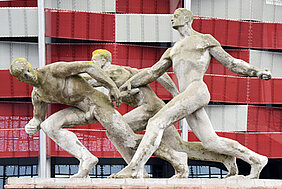Konferencje & warsztaty

Imaginations and Configurations of Polish Society – From the Middle Ages through the 20th Century
Internationale Konferenz, Halle/Leipzig, 22.–24. Oktober 2014
Die internationale Konferenz untersucht Polen als ein europäisches Gemeinwesen, das im Laufe seiner gut 1000jährigen Geschichte territorial stark variierte, und sich daher mit Kategorien nationaler Geschichtsschreibung nur unzureichend erfassen lässt. Ziel ist es, die Konfigurationen und Rekonfigurationen ebenso wie die Imaginationen polnischer Gesellschaft Epochen übergreifend in den Blick zu nehmen. Dies bedeutet, die staatliche Perspektive in den Hintergrund zu rücken und die wechselnden, teilweise widerstreitenden politischen, sozialen und kulturellen Orientierungen kleinerer Einheiten bzw. Gruppen interdisziplinär zu beleuchten.
Konzeptioneller Ausgangspunkt der Konferenz ist die Frage nach Vorstellungen von Gemeinschaft und Gesellschaft (społeczeństwo). Es interessieren die jeweils unterschiedlichen Kriterien der Zugehörigkeit zur politischen und kulturellen Elite ebenso wie konkurrierende Vorstellungen von Gemeinschaft: der religiösen, der ethnisch-nationalen, der bäuerlichen, der städtischen, der geschlechtsspezifischen etc.
Die Konferenz ist ein Kooperationsprojekt des Aleksander-Brückner-Zentrums, des Instituts für Geschichte an der Polnischen Akademie der Wissenschaften Warschau (IH PAN) und des Geisteswissenschaftlichen Zentrums Geschichte und Kultur Ostmitteleuropas Leipzig (GWZO). Sie wird überwiegend aus Mitteln der Deutsch-Polnischen Wissenschaftsstiftung finanziert.
Program
Wednesday, October 22
Conference venue: Franckesche Stiftungen zu Halle
| 1:00 pm | Welcome & Introduction | Yvonne Kleinmann (Halle) |
| Panel I: Political Rule and Medieval Society in the Polish Lands: An Anthropologically Inspired Revision | ||
| 1:20 pm | Introduction | Zbigniew Dalewski (Warsaw/ Białystok); Jürgen Heyde (Halle/Leipzig) |
| 1:40 -3:10 pm | “The Baptism of Poland”: Power, Institution and Theology in the Shaping of Monarchy and Society (10th–12th c.) | Stanisław Rosik (Wrocław) |
| Vikings or Slavs - The Archeological Interpretation of the Early Piast Period and Its Multidisciplinary Dilemma | Wiebke Rohrer (Heilbronn) | |
| Coffee/ Tea Break | ||
| 3:30 -5:00 pm | Migration and Ethnicity in Medieval Poland: On the Role of „Ethnic Markers“ | Jürgen Heyde (Halle/Leipzig) |
| Spaces of Communication: Patterns in Medieval and Early-Modern Polish Towns | Urszula Sowina (Warsaw) | |
| 5:00 -5:30 pm | Comment on the Session & General Discussion | Christian Lübke (Leipzig) |
| 6:00 pm | Reception | IZEA (Interdisziplinäres Zentrum zur Erforschung der Europäischen Aufklärung) |
| 7:00 pm | Keynote Lecture (IZEA Library): How Polish is Polish History? | Moshe Rosman (Bar Ilan) |
Thursday, October 23
Conference Venue: Franckesche Stiftungen, Halle
| Panel II: Multiple Loyalities: Coexistence of Political, Territorial and Religious Self-Conceptions in Early Modern Communities | ||
| 9:00 am | Introduction | Yvonne Kleinmann (Halle); Tomasz Wiślicz-Iwańczyk (Warsaw) |
| 9:20 -10:50 am | Transnational Nobility in the Polish-German Borderlands. The Loyalties of Boguslaw Radziwill (1620-1669) | Karin Friedrich (Aberdeen) |
| Political Discourses of the Polish-Lithuanian Commonwealth: An Attempt at Description | Anna Grześkowiak-Krwawicz (Warsaw) | |
| Coffee/ Tea Break | ||
| 11:10 -12:40 am | Competing Loyalties of Jews in Private Towns of the Grand Duchy of Lithuania: The Case of Sluck | Maria Cieśla (Warsaw) |
| Confessional Fractionalization of the Polish-Lithuanian Commonwealth in the 18th Century. New Perspectives in Historical Geography
| Bogumił Szady (Lublin) | |
| 12:40 - 1:10 pm | Comment on the Session & General Discussion | Michael G. Müller (Halle) |
| Conference Venue: GWZO Leipzig | ||
| 6:00 pm | Welcome at the GWZO Leipzig | Christian Lübke (Leipzig) |
Friday, October 24
| 9:00 am | Panel III: Facing a Fantasy: Concepts of Community in the Imperial Setting of the 19th Century | |
| Introduction | Dietlind Hüchtker (Halle/Leipzig); Joanna Nalewajko-Kulikov (Wasaw) | |
| 9:20 -10:50 am | On the Frontiers of the Former Rzeczpospolita: Polish Theater and Society versus Empire-Nation Relations in 19th-Century Kyiv | Ostap Sereda (Lviv) |
| Reform from Above, and Politics from Below. Peasants in the Prussian Part of Poland | Karsten Holste (Halle) | |
| Coffee/ Tea Break | ||
| 11:10 -12:40 am | The Vision of the Enlightened Jew in 19th-Century Europe: The Case of the Maskilic Community of Vilna | Lara Lempertiene (Vilnius) |
| Identity under Scrutinity: The First World War in Local Communities | Maciej Górny (Warsaw) | |
| 12:40 -1:10 pm | Comment on the Session & General Discussion | Halina Beresnevičiūtė-Nosálová (Brno) |
| Panel IV: Counter-Narratives of the 20th Century? - Re-Configurations of Local Society under Conditions of Migration, Violence and Transformation | ||
| 2:20 pm | Introduction | Dobrochna Kałwa (Warsaw); Katrin Steffen (Lüneburg) |
| 2:40 -4:10 pm | Bearers of Local Stories: Memory of the Eastern Borderlands (kresy) and Reconsideration of the Historcal Record | Olga Linkiewicz (Warsaw) |
| Migration, Society and Memory: Two Small Towns in the ziemia zachodnie after 1945 | Katarzyna Woniak (Berlin) | |
| Coffee/ Tea Break | ||
| 4:30 -6:00 pm | The Plundering of German Property and the Reconstruction of Social Order in Central Europe after 1945 | Kornelia Kończal (Florence) |
| Translating Karl Dedecius: Łódź, Historical Politics, and the Translocal Re-Configuration of Violence and Migration | Winson Chu (Milwaukee) | |
| 6:00 -6:30 pm | Comment on the Session & General Discussion | Jan Kusber (Mainz) |
| 6:30 -7:00 pm | Final Discussion | Dietlind Hüchtker (Halle/ Leipzig); Yvonne Kleinmann (Halle); Tomasz Wiślicz-Iwańczyk (Warsaw); Joachim von Puttkamer (Jena) & others |
Venue:
October 22-23,
Franckesche Stiftungen zu Halle
Haus 1 (Amerika-Zimmer)
Franckeplatz 1
D-06110 Halle (Saale)
October 22 - Keynote
IZEA Library (Zweigbibliothek Europäische Aufklärung)
Franckeplatz 1
Haus 54
D-06110 Halle (Saale)
October 24
Geisteswissenschaftliches Zentrum Geschichte und Kultur Ostmitteleuropas (GWZO)
Reichsstr. 4-6
Specks Hof (Eingang A)
D-04109 Leipzig